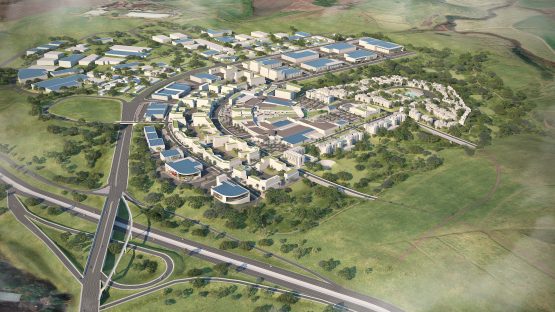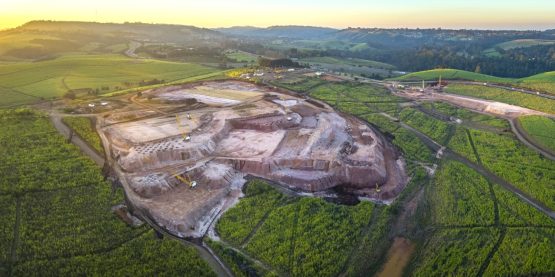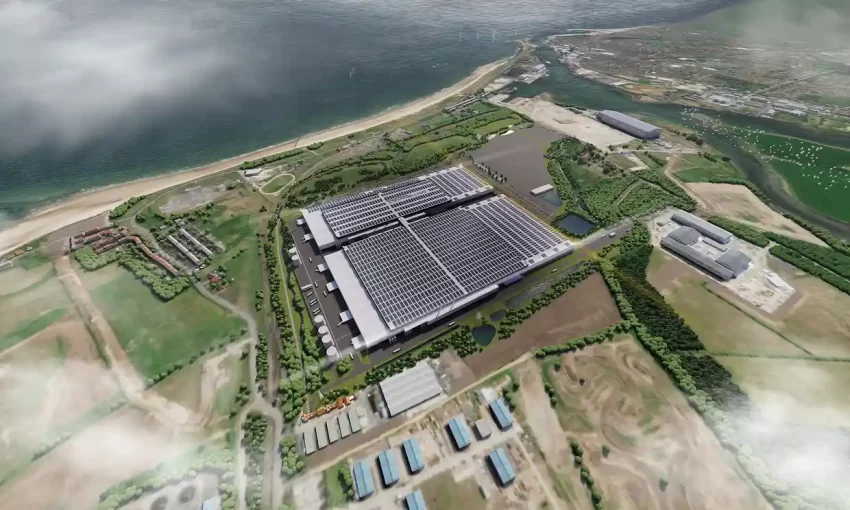You can also listen to this podcast on iono.fm here.
It’s almost two years since the devastating KZN riots which shocked South Africa and the world. But how is KwaZulu-Natal doing? Have investor confidence levels picked up, and who are the investors?
With this being a property podcast, on the latest episode, we have the CEO of Fundamentum Property Group, Carlos Correia, speaking about the R15 billion Westown mixed-used mini-city development in KwaZulu-Natal that launched construction last year on its first phase.
Correia is the founder of the group, which is a leading unlisted property developer and investor, largely in the retail or shopping centre space. He is also the brainchild behind the Westown mega development – one of the biggest new property developments on the go in SA currently, which was launched not just post the riots but following the KwaZulu-Natal floods last year.

Carlos Correia, CEO of unlisted Fundamentum Property Group, explaining the context of the Westown mixed-used development during a visit by Deputy President Paul Mashatile recently. Image: Supplied.
Highlights
Fundamentum launched infrastructure rollout for its Westown development in Shongweni, west of Durban, which we covered back in September 2022. But this project has been years in the making. Give us a little bit of background on how the group got involved in this project on Tongaat Hulett land.
“The initial purchase we did of this parcel of land in the Outer West, in Shongweni, was back in 2016. At the time, we really were purchasing 85 000 bulk square metres, and the focus was to do a regional mall.
“We then had to go through various statutory requirements, and by 2019 Tongaat Hulett had got all their rights in place, Spluma [Spatial Planning and Land Use Management Act] had been approved, and they then got approval for about 515 000m2 of that node to be developed.”
“When we purchased the original portion, the intention was always that we would do what we know best, which is top-structure development, and Tongaat would come along with us and develop this new city in the outer West, like they’ve developed all the other precincts in Durban all the way up the North Coast …”
“I think we are all aware of what happened to Tongaat Hulett from 2019 onwards. Unfortunately, they faced some challenges, and that became quite a challenge for us as well. That was the one problem we had.”
Read/listen:
Construction on KZN’s new mini city Westown to finally begin
Tongaat Hulett woes could hurt North Coast development boom
Tongaat Hulett: Developments division under scrutiny
“Then something called Covid also came along in 2020 into 2021, so we had to relook at this entire investment of ours. What actually came out [is that] there’s always an opportunity, and we realised that we had to start engaging with Tongaat Hulett because the best example maybe I can use is it’s like trying to develop a Gateway Shopping Centre in Umhlanga, and nobody else is putting infrastructure into place for the rest of the property to be developed, or the surrounding land.”
Tongaat woes
“That became quite a challenge because Tongaat Hulett was not in a financial position to do that.”
“After a lengthy period of negotiations with Tongaat Hulett, we decided to acquire the development rights that surround the initial purchase of the first 85 000m2. So we ended up buying another 430 000-odd bulk square metres and the development rights.”
“Maybe the best example I can use for your listeners is that it was a cut-and-paste model of Waterfall [City]. It was really no different. Tongaat Hulett just owned the land [in Shongweni].”
Listen/read:
Shoppers back at mega malls big time
‘Mr President, come see what we’ve done at Waterfall City’
Read the AG’s report before you invest in a municipality, says Sapoa CEO
“We bought the development rights [as had been done] many, many years ago when the Mia family owned the property and the land [in Waterfall Gauteng], which they still do today, and Atterbury bought the development rights [through Attacq]. So we went from really wanting to just develop a regional mall of about 72 000m2 back in 2019 – and we were quite pre-let by then – to having to reassess the entire [Westown] development.”
“In hindsight, to be honest, maybe it was also a blessing for us. Yes, it goes back quite a bit that we’ve been involved in this project and in the journey we’ve gone through at Tongaat Hulett.”
Where is the overall project at the moment? Is the key bulk infrastructure in place, and has construction started on the regional mall, which is anchoring the development, as you say, similar to Waterfall in Gauteng?
“I think one of the things we needed to address was bulk infrastructure because Tongaat Hulett was not in a position to do that. We had then acquired the development rights – and our relationship with eThekwini [municipality] goes back many, many years. We have developed substantially in some of the disadvantaged areas here in eThekwini, and we had to go to the city to assist us.”
“Even though the city had its own challenges, it also had access to national infrastructure funding. In August last year, we ended up signing an MRA [mutual recognition agreement] with eThekwini.”
“The MRA was for R733 million, where the city [of Durban] is putting in close to R600 million and we’re investing another R133 million into bulk infrastructure.”
“And that is probably the initial infrastructure that’s required to unlock what you refer to as the mall, which is called Westown Square.”
“This infrastructure had gone to tender. We then appointed Stefanutti Stocks, and late last year, Stefanutti Stocks started with the bulk infrastructure. Right now, the roads are being developed; [there’s] a road called Kassier Road that cuts across the west.”
“There’s also funding for water-treatment works. We found the Outer West was really underserviced, and therefore we needed some bulk infrastructure. The city was able to secure some of this funding from national infrastructure … We are currently building a water-treatment facility.”
“There was also some bulk water supply [where] we needed more pressure. So the city came to the party on that. And there’s been the electricity, which is already in place. So I must compliment the municipality or the City of Durban and eThekwini for the commitment they’ve shown to get this project going because, obviously, investor confidence was a little low last year.”
When is construction on the mall set to begin? Please also highlight some of the key features and tenants secured for the mall.
“Earlier, I mentioned the word ‘hindsight’ and maybe how difficult Covid was for everybody, as well as the rioting in our province. But in hindsight, we were able to also relook at retail.”
“Just maybe to answer the first part of your question, we [have] already awarded the contract to Stefanutti Stocks Building. They’ve been onsite building for the last couple of months. It is anticipated [the mall’s] opening will be on 27 March 2025.
“As we talk right now there’s a lot of activity onsite already with the building of Westown Square.”
“When I refer to hindsight, I think those who have been long enough in property and in retail – as I’ve been for nearly 30 years – will realise that retail was fundamentally changing before Covid. I think retailers [and] we as developers were realising that, and I believe maybe what Covid did was accelerate how we look at retail.”
Future of retail
“So one of the things we did because we have two firms of architects that we appointed at Westown Square – Boogertman + Partners and MDS based in Johannesburg – was to start engaging a lot with retailers and asking them how they saw the future of retail after Covid.”
“It was quite an interesting journey because a lot of the feedback we were given [made us realise] we couldn’t do a regional mall of that size anymore, and we had to narrow it down. Right now, as I talk, it’s a 50 000m2 [mall].
“I hate to use the word ‘mall’ since it’s not a mall; it’s a retail high-street shopping experience because it’s not covered.”
Listen/read:
Why major malls need to continually innovate and invest
Covid can’t break SA’s love affair with shopping malls
Shopping malls need to figure out how to move forward
“It’s not one of your traditional regional malls. It’s a little different because the feedback we are getting from tenants is that in the area we are in, they want a little more openness and more high-street-level shopping. And that’s what we did. We were able to work with some of these tenants that have already committed; hence we are now building Westown Square the way it has been designed.”
“The other part of the question was about tenants. I think retail is quite robust. I think South Africans are robust, but retail is quite robust. I’m always astounded. I follow your podcast [and] the articles about how retail is bouncing back – and yes, sometimes they have challenges.
“Today we have challenges with the electricity and that impacts the bottom line of every property-owning company.”
“But the reality is that retailers are still trading, and they’re still looking for growth. We were fortunate enough [to be] developing in an area that was perhaps a little underserviced in terms of what we needed [and] what we thought we could bring to the market.”
“We were fortunate enough that we were not the kind of developer that would come and just develop a retail facility and, when that was complete, have no further investment in the area. We are actually not only the developers of Westown Square; we are the developers of Westown. I like to use examples: it’s like you own Mall of Africa, and you also own Waterfall.”
“So we were in the fortunate position of being able to design and look at our tenant mix with different eyes. We were able to look at maybe a more aggressive yield and return and get the right tenant mix. And yes, as we talk today, it’s going to be anchored by a Checkers Hyper, an 8 500m2 Hyper. Along with that, they bring all their other brands, the outdoor brands, Checkers Little Me, Uniq Clothing, Petshop, and the liquor stores. Pick n Pay is in there as well as a food anchor.
“We are currently talking to Woolworths to bring them on board. So we will have three major food anchors.”
“From a fashion perspective, we brought in the Retailability Group, which is based in KZN. So it’s very close to our heart to try and bring as many of our local companies [as possible] into this retail space. The Mr Price Group and Dis-Chem Group have come in, Pepkor has come in, [as have] Clicks and The Foschini Group.”
“We are in the last stages of final negotiations with Truworths and H&M …”
Read:
Edgars-owner Retailability relaunches Boardmans online
Shoprite opens its first apparel store, with one eye on PnP Clothing
H&M partners with Superbalist, opens new CT store
Who are your partners and co-investors in the Westown development?
“The history of our company goes back to the mid-1990s when Mlungisi Hlongwane and I started the company, and we were invested in Vukile [Property Fund] from 2005 to 2011.
“Hence the history of this is [that] Fundamentum really came about in 2012, after Mlungisi and ourselves had exited, through a vehicle called Lazarus Capital, out of Vukile.”
“We really were looking to focus more in KZN at the time, although we had assets that we still own in Gauteng and in the Free State.”
“But the reality was that we wanted to spend more time in a market where we understood where we had come from. We understood the social aspect of KZN, we understood the political environment, we understood the economic environment.”
“Back in 2012, the Bergsma brothers [Sean and Donavan] who owned a company called Ignition – at the time we had developed for them, [and] we had a meeting about creating a privately held property fund. That was the beginning of Fundamentum.”
“The one partner emigrated to the UK, but right now the Fundamentum shareholders are Sean and Donovan Bergsma and myself. We are the three shareholders of Fundamentum.”
“When it comes to Fundamentum’s development in the Outer West, in Westown, we have an empowerment group that owns 12.5% called OuterWest Investments … That’s headed by Dr Nomzamo Tutu and Senzo Masengemu.”
“They are partners in Westown Square. In other developments we’re doing, we have partners as well, whom we will partner with as we unlock other parts of Westown.”
Read/listen:
Growthpoint eyes R250m CSI-linked BEE deal
Bullish Vukile’s R700m cap raise to fund Spanish and SA expansion
Exclusive: Durban venture capitalists buy Gumtree SA from eBay-linked Adevinta
Why the west of Durban? Why KZN? Clearly, the group has investor confidence in the province despite the issues the province has faced in the past couple of years, in particular the KZN riots where property companies, in particular, were hard hit … I know you’re part of the KZN Comeback campaign.
“I think we’ve still got to look at Fundamentum and the fundamentals, and the reality is that KZN is still the second-largest economic contributor to SA’s GDP after Gauteng. I think we have the second-largest population, and still, a lot of businesses are invested here.”
“Yes, the riots were absolutely detrimental to investor confidence but there are companies, national companies, that are still based here – Aspen, Unilever, Derivco. I can go on. Mr Price, Grindrod.”
“Those companies are still invested here. I think the riots were a very, very sad [event] that happened to the province. But we came out of the riots, in my view, and we [thought] how do we make things better? How do we turn things around where people may be saying, well, KZN is not a place to invest.”
“We’ve taken a different view. We see an opportunity. We believe that the city is wanting investment … I think if you look at the largest investment the city made into infrastructure [it] must have been around the World Cup days. If you look at the investment now, you’ve got to back the city when it says, ‘Welcome back …’.
Investor confidence
“We never left. We’ve always been here. There are many, many companies that are here. I talk about investor confidence in KZN, and I’d like to maybe challenge any of my property colleagues to tell me whether they have absolute investor confidence in the other provinces they live in – because we all have our challenges.”
“The reality is how you manage those challenges and how you work hand-in-hand with communities and with your partners in the area. We still have a strong belief in KZN.”
“When you’ve been in property long enough and seen all these dips and all these cycles, there’s always been a fairly reasonable trajectory of property value in South Africa. So we still believe in KZN, and we have strong faith in KZN, and we will carry on investing in KZN.”
Read/listen:
KZN’s newest oasis, on the mid-south coast
‘Construction mafia’ disrupting post-unrest rebuilding effort
‘This anarchy has resulted in well over R20bn worth of damage’ – Sapoa
Westown is more than just that Westown Square mega mall. What else can we expect as part of the mixed-use property offering in Westown over the development phase in the next 10 to 15 years?
“Our business is very long term. I suppose the short term for us is five years, the medium term is 10 years, and the long term is anything from 15 to 25 years. So in the short term, what we’re trying to do at Westown is to really get Westown Square – and that’s what’s being built now, obviously [with] its infrastructure – in place.”
“That can then be supported by a number of interconnected precinct spaces, experiences.
“And that is why a hospital licence has been awarded.”
“There’s warehousing and logistics, and we are in discussions with a fairly big, listed retail group about how we’re going to deal with logistics and the warehousing. There are business and commercial activities. There’s a huge component of residential, and we’re currently also dealing with a very, very big property player about investing in Westown Square.”
“So for us to have these interconnected precincts is very important because Westown is not about a retail experience. In fact, maybe we are a little different. I think Waterfall’s success was based on the residential component coming first and the commercial one following.
“The difference with us is that we already have a big residential component in the Outer West, and the reality is that the population in the Outer West has grown by about 6% per annum over the last nine years.”
“So we have this population growth, we have these houses that are there, but we want to add more so that eventually the Outer West becomes an integrated urban development and not divided by the N3, because we are just off the national N3 highway.”
Listen to the full episode here.
You can also listen to previous episodes of The Property Pod here.












